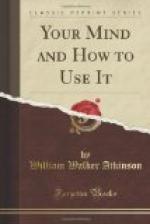Inasmuch as impressions may be made through any of the sense organs, one problem in the improvement of memory concerns the choice of sense avenues. As an infant you used all senses impartially in your eager search after information. You voraciously put things into your mouth and discovered that some things were sweet, some sour. You bumped your head against things and learned that some were hard and some soft. In your insatiable curiosity you pulled things apart and peered into them; in short, utilized all the sense organs. In adult life, however, and in education as it takes place through the agency of books and instructors, most learning depends upon the eye and ear. Even yet, however, you learn many things through the sense of touch and through muscle movement, though you may be unaware of it. You probably have better success retaining impressions made upon one sense than another. The majority of people retain better things that are visually impressed. Such persons think often in terms of visual images. When thinking of water running from a faucet, they can see the water fall, see it splash, but have no trace of the sound. The whole event is noiseless in memory. When they think of their instructor, they can see him standing at his desk but cannot imagine the sound of his voice. When striving to think of the causes leading to the Civil War, they picture them as they are listed on the page of the text-book or note-book. Other people have not this ability to recall in visual terms, but depend to greater extent upon sounds. When asked to think about their instructor, they do it in terms of his voice. When asked to conjugate a French verb, they hear it pronounced mentally but do not see it on the page. These are extremes of imagery type, but they illustrate preferences as they are found in many persons. Some persons use all senses with ease; others unconsciously work out combinations, preferring one sense for some kinds of material and another for other kinds. For example, one might prefer visual impression for remembering dates in history but auditory impression for conjugating French verbs. You will find it profitable to examine yourself and discover your preferences. If you find that you have greater difficulty in remembering material impressed through the ear than through the eye, reduce things to visual terms as much as possible. Make your lecture notes more complete or tabulate things that you wish to remember, thus securing impression from the written form. The writer has difficulty in remembering names that are only heard. So he asks that the name be spelled, then projects the letters on an imaginary background, thus forming visual stuff which can easily be recalled. If, on the contrary, you remember best the things that you hear, you may find it a good plan to read your lessons aloud. Many a student, upon the discovery of such a preference, has increased his memory ability many fold by adopting the simple expedient of reading his lessons aloud. It might be pointed out that while you are reading aloud, you are making more than auditory impressions. By the use of the vocal organs you are making muscular impressions, which also aid in learning, as will be pointed out in Chapter X.




